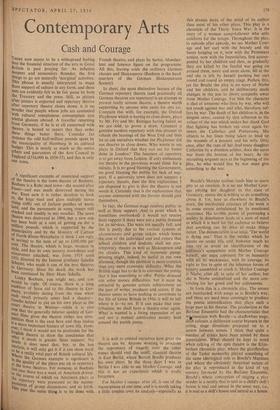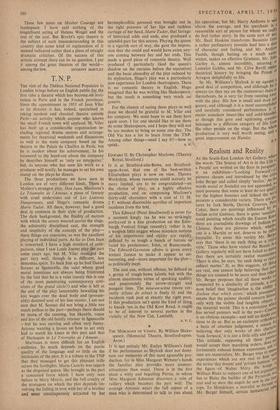Contemporary Arts
Cash and Courage
THERE now seems to be a widespread feeling that the financial situation of the arts in Great Britain is past praying for. As inflation deepens and economists flounder, the first things to go are naturally 'marginal' activities. This phrase is usually interpreted to mean State support of culture in any form, and these cuts are evidently felt to be fair game by both the Treasury and the press. Still, as picture after picture is exported and repertory theatre after repertory theatre closes down, it is no wonder that people whose jobs are connected with cultural conspicuous consumption cast wistful glances abroad. A traveller returning from Germany, if he is at all concerned with theatre, is bound to report that they order these things better there. Consider for instance the odd half-million pounds spent by the municipality of Hamburg in its cultural budget. This is nearly as much as the entire gittnts and guarantees of the Arts Council in -England (£554,000 in 1954-55), and this is only one town.
A significant example of municipal support of the theatre is the town theatre of Bochum. Bochum is a Ruhr steel town—the second after
ssen—and was much destroyed during the war. Even now it is rather desolate to look at, the huge steel and glass multiple stores land, stiffly out of forlorn patches of waste land, and the pavements in some streets still cracked and muddy in wet weather. The town theatre was destroyed in 1944, but a new one has been built at a cost of getting on for a million pounds, which is supported by the municipality and by the Ministry of Culture 14 North-Rhine-Westphalia (1 think I am right in saying) to the tune of up to £100.000 per Year The theatre, which is large, modern in style, and has its own scenery workshops and storerooms attached, was from 1919 until 1951 directed by the famous producer Saladin Schmitt; who made it one of the best theatres itt Germany. Since his death the work has been continued by Herr Hans &Italia. Lucky Bochum, you might say, and you would be right. Of course, there is a long tradition of State aid to the theatre in Ger- manY, Probably dating from the time when each small princely court had a theatre- Goethe helped to put on his own plays at the court theatre in Weimar--while it is also true that the generally inferior quality of"Ger- man films gives the theatre rather less com- petition than is the case here and thus makes ie a more important feature of town life. How- ever, think it would not be profitable for the glish theatre to draw the conclusion that W-12 doubt it needs is greater State support. No " „ouot it does need that, but. in the last : alYsis it will only get it it it can show itself to „_he a really vital part of British cultural Itfe iwtt eret- I, e German example is significant is at the quality of the plays put on in repertory Iasi town theatres. For instance, at Bochum v Year there was a week of American drama. l',',ethe course of which six American plays in „9. .repertory were presented to the accom- vntnent of discussions, and so forth. u's Year th group e same thing is to be done with
French theatre, and plays by Sartre, Monther- lant and lonesco figure on the programme. All this, leaving aside the ordinary German classics and Shakespeare (Bochum is the head- quarters of the German Shakespearean Society).
In short, the most distinctive feature of the German repertory theatre (and practically all German theatres are repertory) is ah attempt to present really serious theatre, a theatre worth supporting by anyone who cares for this art. Compare this with, for example, the Oxford Playhouse which is having to close down, plays by Mr. Fry and Mr. Rattigan having failed, so we are : told, to prove a draw. Compare a genuine modern repertory with this attempt to rehash the leavings of the West End and then let us ask ourselves whether the Playhouse did not deserve to close down. Who wants to see plays in Oxford that they can see far better done in London? The function of repertory is to get away from fashion. If only enthusiasts for theatre in the provinces would think for a minute. It is no good blaming the Government, no good blaming the public for lack of sup- port. If a university town does not support a repertory theatre, then the first explanation I am disposed to give is that the theatre is not worth it, Certainly that is the explanation that anyone connected with the theatre should give themselves., In fact, the German stage receives public as well as State support. And (a point which is sometimes overlooked) it would not receive State support if there were not a public demand for its services. The seats arc usually full, and this is partly due to the various systems of abounentents and group. tickets which lower the cost of the individual seat and ensure that school children and students shall see con- temporary theatre as well as Shakespeare and the classics. This kind of economic pump- priming might, indeed, be useful in our own dilemma, though the probleM is more complex than any mere economic difficulty. What the British stage has to do is to convince the public that it has something to offer. Public demand can solve money difficulties. but it must be attracted by genuine artistic achievement on the part of writer, producer and actors. If the theatre seems to have nothing to contribute to the life of Great Britain in '1956, it will, be left where it is—to rot, If it can make that con- tribution. we shall have a theatre once again. What is wanted is a living expression of art and not a mutual admiration society held around the parish pump. • It is well to remind ourselves how great the theatre can be. Anyone wanting, to proclaim the supremacy of tragedy over the other muses should visit the small, classical theatre in East Berlin, where Bertolt Brecht produces his own plays. In the three days I was in Berlin I was able to see Mother Courage. and this is not an experience which is easily forgotten. • For Mother Courage, after all, is one of the masterpieces of our time, and it is worth taking a little trouble over its analysis—especially as this reveals more of the mind of its author than most of his other plays. This play is a chronicle of the Thirty Years War. It is the story of a woman camp-follower who sells comforts for the troops. Throughout the play, in episode after episode, we see. Mother Cow- age and her cart with the brandy and the boots hanging on it, now with the Protestant armies, now with the Imperialists, first accom- panied by her children and then, as gradually' they are killed by the fearful war going on around them, more and more alone, till at the end she is left by herself pushing her cart round and round an empty stage. Pathos, this, yet for Brecht the play is no story of Niobe and her children, and he deliberately made changes in the text to divert sympathy away from Mother Courage. For him the character is that of someone who lives by war, who will not revolt against war and who, therefore, suf- fers by war. The death of her children is, in the deepest sense, caused by that adhesion to the values of the war which makes her thank God that fighting has broken out once again be- tween the Catholics and Protestants. She objects to her linen being taken to bind up the wounds of a peasant and his wife. Only once, after the rape of her deaf-mute daughter Catherine by a drunken soldier, does she curse war from the bottom of her heart. As the recruiting sergeant says at the beginning of the play, he who would live by war must give something to the war.
*
Brecht's Marxist realism leads him to scorn pity as an emotion. It is no use Mother Cour- age pitying her daughter or the state of Germany, unless she is willing to do something about it. Yet, here as elsewhere in Brecht's work, the intellectual structure of the work is to some extent unbalanced by its emotional overtones. His terrible 'power of portraying a society in dissolution leads to a state of mind in which it is hard for the audience to believe that anything can be done to make things better, The denunciation is so total. 'The world is dying out.' That is the verdict which he passes on social life, and, however much he may try to avoid an identification of the audience's sympathies with Mother Courage herself, she must represent for us humanity with all its weaknesses, with its courage, its right to live in spite of the inhuman forces of history assembled to crush it. Mother Courage is Niohe, alter all, in spite of her author, but she is Niohe unidealised and the more con- vincing for her greed and her callousness.
In form this is a chronicle play. The scenes are interlarded with songs as is Brecht's way, and these are used most cunningly to produce the poetic intensification that plays such a large part in his theatre. The production at the Berliner Ensemble had the characteristics that wliassociate with Brecht—a shadowless stage, dr5b colours, a deliberate coarse bravura in the .acting, stage directions projected on to a screen between scenes. 1 think that quite a number of critics have been misled by these innovations. What should be kept in mind when talking of the epic theatre is the Eliza- bethan chronicle play, where the glorification of the Tudor monarchy played something of the same ideological role as Brecht's Marxism and where the obviously theatrical nature of the play is reproduced in the kind of toy scenery favoured by the Berliner Ensemble. Brecht's whole conception of staging a play resides in a reality that is real as a child's doll's house is real and unreal in the same way, i.e., it is real as a doll's house and unreal as a house. These few notes on Mother Courage are inadequate. I have said nothing of the magnificent acting of Helena Weigel and the rest of the cast. But Brecht's epic theatre is the subject of such misunderstanding in this country that some kind of explanation of it seemed indicated rather than a piece of straight dramatic criticism. Of the success of this artistic attempt there can be no question. I put it among the great theatres of the world—











































 Previous page
Previous page